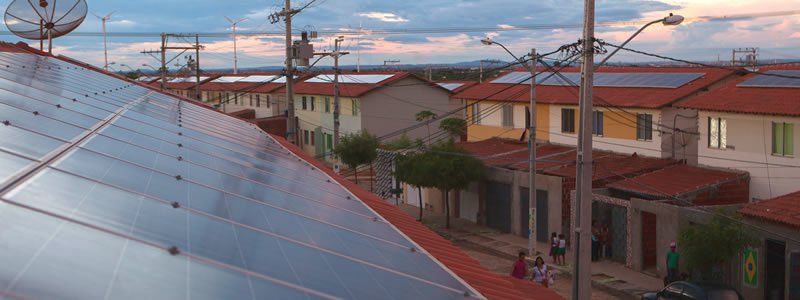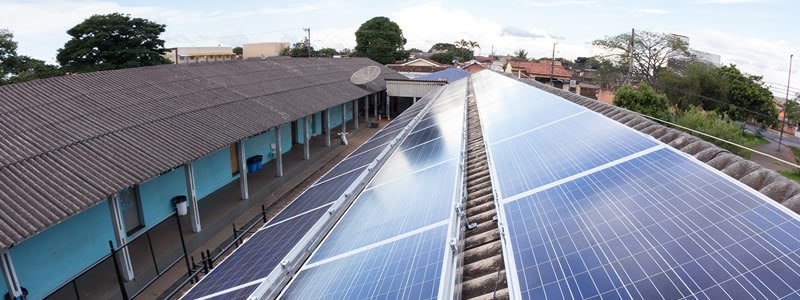
Image courtesy of Greenpeace Brazil
Solar power in Brazil received a boost last week as Brazilian development bank BNDES announced it had approved its first solar loan, a 529 million-reais (155.1 million-euro) financing agreement for the 150-megawatt Pirapora solar complex in Minas Gerais state, under development by French company EDF Energies Nouvelles.
The financing, which will include up to 220 million reais in infrastructure bonds, will account for around 80 percent of the total project costs, and the PV plant is slated to enter operations in August of this year.
But despite the good news, Brazil still faces a major infrastructure financing shortfall.
"Industry observers argue that local content restrictions, while fostering local manufacturing and safeguarding jobs, make the country uncompetitive."
In a study published last year BNDES said that the country requires investment of around 234 billion reais (68.5 billion euros) in energy infrastructure inside its major metropolitan areas. However, financing has been stymied to some extent by the country’s local content rules, which demand that projects must source a majority of supplies locally in order to qualify for accessing certain types of financing.
Industry observers argue that such restrictions, while fostering local manufacturing and safeguarding jobs, make the country uncompetitive.
There has been some renewables-focused financing, most recently in March when BNDES approved special financing conditions for renewable generation projects in the Amazon region in partnership with state-owned distribution company Amazonas Energia. The projects, which aim to convert power generation in the region from diesel to renewables, will be allocated money from the national climate change fund.

Image courtesy of Greenpeace Brazil (photographer: Otavio Almeida)
Brazil has so far held three solar auctions, with tendered projects totalling close to 3 gigawatts. However, it also cancelled an auction for reserve power supply contracts in December due to a lack of demand, reflecting a recession-driven drop in electricity demand.
“Developers are facing difficulties in getting projects online, which has a lot to do with financing and Brazil’s bleak macroeconomic situation, strongly impacted by the crisis,” according to Markus Vlasits, CCO of the Brazilian branch of distributed solar company Faro Energy.
“Financing is very challenging because most loans are geared towards utility scale, but even for that segment the number of projects financed is very low. Financing is not geared towards distributed generation (DG). We need to ask ourselves if Brazil is doing itself a favour with such strict local content rules for solar,” he says, “which obey a protectionist tradition in Brazil.”
“Brazilians are very open to innovation. Anything new, and especially if it comes from abroad, is seen as cool, and there is huge interest in solar power. There is, what I call, ‘positive curiosity,’” Vlasits says.
He argues, however, that solar power remains out of reach for the average middle-class Brazilian family. Interest rates for loans from banks are very high, and while there is credit available for rural areas, financing for renewable energy projects has been very small.
"If you compare the Brazilian regulatory framework for DG with any other country, Brazil’s policy is by far the most developed and sophisticated. We are bullish about DG in Brazil."
Even so, he is optimistic regarding DG growth, as the economy is recovering and drivers of the sector’s growth go beyond government policy. Faro Energy is receiving a lot of interest from customers. Considering it is the largest electricity market in South America, the globally operating company sees Brazil as its largest potential growth market.
“But getting funding is so much easier in other countries, when compared to Brazil, as we have such high interest rates,” he says. “Procuring debt from multilateral institutions is difficult because the country is no longer investment grade, and electricity is heavily taxed.”
“But if you compare the Brazilian regulatory framework for DG with any other country, Brazil’s policy is by far the most developed and sophisticated, which is good news. We are bullish about DG in Brazil because it is competitive, which cannot be said of utility-scale projects, where the cheapest power source is wind,” he adds.
But the local content rules remain an obstacle to project development, where BNDES is the only provider of long-term funding. They are, however, actually scaling down this funding, particularly with regards to subsidized financing of renewable energy, according to Javier Rodríguez de Colmenares, head of energy infrastructure at the Inter-American Investment Corporation (IIC) in Washington DC.
“What we are doing at IIC is providing additional local-currency financing, where there is not enough local content, by complementing with financing in reais, which eliminates exchange risk, and which can have terms of up to 18 years. We can do as much as 25 percent of the total project cost, which is much broader than BNDES’ financing, covering interest expenses during construction, delays or capital shortfalls during the ramp-up period,” he says.
In March, The IIC said it was considering a 240-million-reais loan to finance the Pirapora I solar park in Brazil, under development by Canadian Solar and EDF EN do Brasil. The Inter-American Development Bank (IDB) is also opening an office in São Paulo to focus on energy and infrastructure financing, which will be the IDB’s only office outside of a capital in all the countries it operates in.
He said that BNDES or Banco do Nordeste loans for solar will remain difficult to obtain due to the local content laws.
“I thought we might see some evolution regarding the local content laws with the new government, but I think it will be quicker to get non-subsidized BNDES loans than to wait for a change.”

Image courtesy of Greenpeace Brazil
Brazil’s DG market is also levied with ICMS, a state-level sales tax, while Brazilian law forbids energy distribution without authorization, instead only allowing for micro-generation.
“However, this is not sustainable, and we are going to see a legal dispute, as we have inconsistencies in regulations,” according to Leandro Borgo, vice president of Brazil’s distributed generation association (ABGD).
He also pointed to the lack of incentive for users to install solar panels, with credit difficult to procure, while locally produced panels are 34 percent more expensive than imported ones.
“The average size of an installation in Brazil is about four kilowatts.It will take a long time to become an industry, as it is not attracting big capital.”
He says the government needs to review the subsidies for renewables, which would enable the growth of rooftop solar, but he is pessimistic of a change to the laws in the short term.
“It’s going to be a long battle,” he says.
Faro Energy, IIC and ABGD will all be represented at Unlocking Solar Capital LATAM, an event completely focused on bankability issues in emerging solar markets in Latin America. The event will also include a dedicated in-depth market session on Brazil. On 15 and 16 June, in Miami, 200+ executives will connect and engage in in-depth discussions to solve LATAM's solar energy funding gap - and get projects realized. Learn more and secure your attendance at latam.unlockingsolarcapital.com
Adam Critchley is the Mexican energy correspondent for Business News Americas
